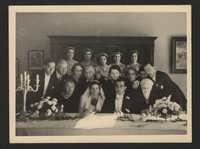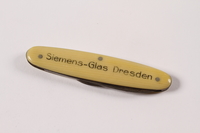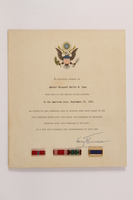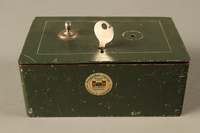Overview
- Brief Narrative
- Festtägliches Gebetbuch, German and Hebrew language prayer book published in 1870.
- Title
- Festtägliches Gebetbuch
- Date
-
publication:
1870
- Credit Line
- United States Holocaust Memorial Museum Collection, Gift of Carol Opton
Physical Details
- Classification
-
Books and Published Materials
- Category
-
Books and pamphlets
- Object Type
-
Judaism--Prayer books (lcsh)
- Materials
- overall : paper, ink
Rights & Restrictions
- Conditions on Access
- No restrictions on access
- Conditions on Use
- No restrictions on use
Administrative Notes
- Legal Status
- Permanent Collection
- Provenance
- The prayer book was donated to the United States Holocaust Memorial Museum in 2018 by Carol Weinschenk Opton, the daughter of Margot and Paul Weinschenk.
- Record last modified:
- 2023-02-23 16:51:06
- This page:
- https://collections.ushmm.org/search/catalog/irn611767
Download & Licensing
In-Person Research
- By Appointment
- Request 21 Days in Advance of Visit
- Plan a Research Visit
- Request to See This Object
Contact Us
Also in Levy and Weinschenk families collection
The collection consists of a folding knife, correspondence, documents, photographs, and publications relating to the experiences of the Levy family and Paul and Margot Weinschenk before, during, and after World War II in Germany and the United States.
Date: approximately 1939

Weinschenk and Levi families papers
Document
The Weinschenk and Levi family papers primarily contain biographical material, correspondence, and photographs related to the Weinschenk and Levi families in Stuttgart and Nuremberg, Germany prior to immigrating to the United States to escape Nazi persecution. Biographical materials include genealogical research, passports, driver’s licenses, and a document stating that Margot Weinschenk had been dropped from the voter registry because she is not of Aryan descent, 1936. Correspondence includes letters from Margot and Paul Weinschenk in New York to his sister Lilly and her husband Sigmund Karl Kohnstamm in Wales, 1940-1942. The photographs include portraits, weddings, and social gatherings of the Levi and Weinschenk families, as well as pre-war photographs of Stuttgart, Germany.

Folding pocket knife owned by a Jewish family who fled Germany
Object
Folding pocket knife brought with Paul and Margot Levi Weinschenk when they fled Nuremberg, Germany, for the United States in 1939.

Three ribbon bars on a service certificate awarded posthumously for a US soldier
Object
Serice recognition certificate signed by President Truman in memory of Walter Lane (Levy) who fell during his service in Germany.

Metal box with key
Object
Metal box with key. Painted green on the outside and red on the inside. There is a detachable tray for smaller items that fits inside the box, as well as a key. A label on the outside of the box reads "Propylden-Muller/Munchen 2 Lenbochplatz7" with the image of a building and the additional words "Wilheim Muller/Buro-Bedart Papierwaren.
Cookbook
Object
cookbook brought with Paul and Margot Levi Weinschenk when they fled Nuremberg, Germany, for the United States in 1939.
Cookbook for three and more people
Object
Cook book brought with Paul and Margot Levi Weinschenk when they fled Nuremberg, Germany, for the United States in 1939.
Prayer book
Object
Prayer book brought with Paul and Margot Levi Weinschenk when they fled Nuremberg, Germany, for the United States in 1939.
Book
Object
Book on Winsbach, Germany, brought with Paul and Margot Levi Weinschenk when they fled Nuremberg, Germany, for the United States in 1939.
Oral history interview with Lily Weinschenk Kohnstamm
Oral History
Lily Weinschenk Kohnstamm discusses her escape from Nazi Germany with her three daughters Hannelore Freedman (née Kohnstamm), AnneMarie Marx (née Kohnstamm), and Grete Goldhill (née Kohnstamm).
Levy and Weinschenk families papers
Document
Contains documents concerning the immigration of Paul and Margot Weinschenk (donor's parents) from Nuremberg, Germany to the United States in 1939.



